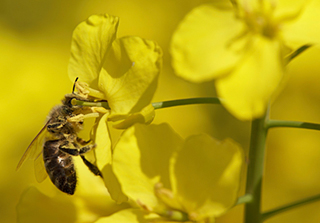FAQ
2. Can biofuels be used in conventional vehicles?
3. Is there a tax concession for biofuels?
4. Is there an existing fuelling infrastructure for biofuels in Austria?
5. Do biofuels pose a threat to the food supply?
6. Are biofuels leading to an increase in food prices?
7. Are biofuels leading to deforestation of the rainforest?
8. Can biofuels replace fossil fuels completely?
9. Biofuels or electric cars?
10. Will there be new biofuels in the future?
1. Do biofuels reduce CO2 emissions?
Yes, if their production needs less energy than will be gained by their combustion.
To evaluate the impact so-called life-cycle analysis for biofuels are created that cover the entire energy consumption for each production step (e.g. the agricultural cultivation, energy consumption in the manufacturing plant, delivery to the consumers). In the end an output-input ratio is obtained, which indicates whether and how much more energy is recovered by a biofuel, than was used for its production.
The European Union has written the renewable energy directive (2009/30/EG), which plans a reduction of at least 35 % using biofuels compared to fossil fuels in Europe. By 2017, this requirement increases to 50% and by 2018 to 60%.
During combustion in the vehicle only the amount of CO2 is released that was needed for the growth of the plant obtained from the atmosphere - biofuels are thus CO2 neutral. Therefore the less energy is needed for the production of a biofuel, the higher are the savings in CO2.
2. Can biofuels be used in conventional vehicles?
Yes, in principle, the change from fossil fuel to biofuel is possible.
If the manufacturer has released a vehicle for a particular biofuel, none adaptations to the unit are required.
Otherwise, when using a pure bio fuel changes to individual parts of the vehicle must be carried out. When vegetable oil is used this concerns for example, the injection system. After switching to biodiesel, the status of the fuel filter should be taken into consideration, because the biodiesel can detach the earlier deposits of fossil diesel due to its good solvent properties, which then clog the filter and cause damages.
With the current addition of biodiesel to fossil diesel and bioethanol to petrol no problems are expected.
3. Is there a tax concession for biofuels?
Yes, biofuels are fully excluded from excise duty.
If you are traveling e.g. with pure biodiesel no fuel tax has to be paid. Even the 85% share bioethanol in super ethanol (E85) is tax-free.
4. Is there an existing fuelling infrastructure for biofuels in Austria?
Yes, in Austria there are gas stations that offer pure biofuels.
By July 2008, pure biodiesel is available in 105 Austrian stations.
5. Do biofuels pose a threat to the food supply?
No, Biofuel and food production can co-exist.
With the introduction of the substitution target of 10% biofuels by 2020, the European Commission has confirmed that this is possible without problems in the sector of food supplies.
The compulsory set-aside of 10% of agricultural land has ended 2008 with the cultivation of the harvests for 2008, whereby only in Austria about 50,000 hectares are available again as agricultural land. Food production has obviously priority. However, in the future both food and raw materials for biofuel production can be grown.
There is enough food provided worldwide to feed the entire world population. However, there is a serious problem of distribution: While nearly one billion people starves, more than one billion people are affected by obesity.
6. Are biofuels leading to an increase in food prices?
No, for a noticeable price increase, the required amount is too low.
In particular in fall 2007, there was a significant increase in food prices. This trend, however, was justified due to massive crop failures and the increased demand of food in the emerging markets of China and India. Compared to the global cultivation area for food the area for biofuels is extremely small.
Special profiteers besides climate extremes such as droughts or floods due to climate change, were financial speculators, who have begun to speculate with food.
7. Are biofuels leading to deforestation of the rainforest?
Biofuels, which are produced in Austria, certainly are not. However, only international binding criteria prevent rainforest from destruction effectively.
In particular in connection with the production of biofuels from palm oil still occurs the problem of deforestation of primeval forests, in order to get land for the production. Due to its fuel properties palm oil is not suitable as a raw material in the European climates. The bulk of European production comes from rapeseed or sunflower oil, with strict sustainability criteria applied to the harvest. Local biofuel production does not lead to the destruction of rainforest landscapes, for the worldwide production of biofuels this is unfortunately not mandatory. To achieve this, global sustainability criteria are essential.
8. Can biofuels replace fossil fuels completely?
No, Biofuels can not replace the entire demand for fossil fuels.
The substitution goal of the European Union is 10% renewable fuels by 2020 (with biofuels and electric vehicles powered by green electricity). Although biofuels can contribute to achieving a reduction in emissions and reducing dependence on fossil oil in Austria and Europe, they certainly cannot replace fossil fuels completely.
It remains unclear which feedstock potential will be there for future biofuels.
9. Biofuels or electric cars?
Biofuels and electric cars.
The goal of a 10% share of renewable energy in the fuel sector cannot be achieved alone by the use of biofuels, but in addition by the promotion of electric cars, which are powered by green electricity. For Austria, the aim is to get 100,000 electric vehicles on the roads by 2020.
The expansion of e-mobility will be expected to be increased in the coming years. Innovation in the development of powerful batteries and the increased production of electric vehicles, which is promoted by individual car manufacturers, will support this trend.
Because a complete substitution of fossil fuels with biofuels will not be feasible, the electric mobility is another important support in the climate change strategy. Seen from this point of view both, the use of sustainable biofuels and the promotion of electric vehicles powered by green electricity, is needed.
10. Will there be new biofuels in the future?
Yes, the development and research into new Biofuels technologies gains worldwide importance.
Examples of biofuels, which are in the testing and demonstration stage, are cellulosic ethanol or synthetic biofuels. All these developments have in common that they are made from waste or residues. Their market maturity and large-scale application is expected in 2015.

Sustainable future
(c) BDI

